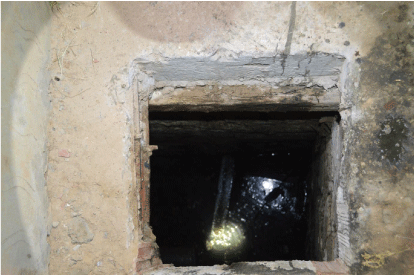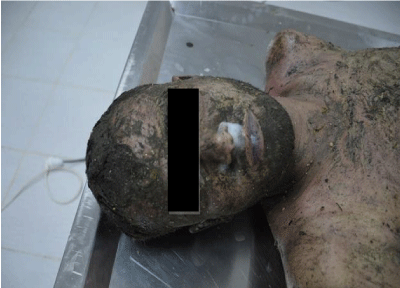
Research Article
Austin J Forensic Sci Criminol. 2019; 6(1): 1081.
Accidental Hydrogen Sulfide Intoxication: About Two Autopsy Observations
Mesrati MA*, Sahnoun M, Boussaid M, Mahjoub Y, Bouzid H and Aissaoui A
Department of Forensic Medicine, TaherSfar Hospital, Tunisia
*Corresponding author: Mesrati Mohamed Amin, Department of Forensic Medicine, Taher Sfar Hospital, Mahdia, Tunisia
Received: August 06, 2019; Accepted: October 14, 2019; Published: October 21, 2019
Abstract
Hydrogen sulfide is a colorless gas, heavier than air and characterized by its rotten egg odor at low concentrations. Its toxicity remains an important problem because of its high rate of mortality. The diagnosis is challenging because symptoms are variable and non-specific. Furthermore, biological confirmation is usually difficult.
We report two autopsy cases of domestic accidental intoxication by Hydrogen Sulfide in two men who were found dead in a septic tank. Investigation of the accident site detected the hydrogen sulfide gaz. Dosage of blood sulfide and thiosulfate was negative. Urinary dosage of thiosulfate was not performed because bladders were empty for the two deceased. The death was attributed to Hydrogen Sulfide intoxication based on memorials, investigation of the accident site, the irritating and fetid odor emitted by the body and the marked asphyxia syndrome.
Keywords: Hydrogen sulfid; Intoxication; Autopsy; Prevention
Introduction
Hydrogen sulfide is a colorless gas, heavier than air and characterized by its rotten egg odor at low concentrations. Its toxicity has been known for several hundred years and remains an important problem because of its high rate of mortality [1]. The symptoms are variable, non-specific and are related to the duration and concentration of exposure [2]. Furthermore, biological confirmation is usually difficult. Thus, the diagnosis is often challenging.
Hydrogen sulfide intoxication has been described mainly in industrial environments (petroleum industry, synthetic textiles, rubber ...) [3,4]. However, domestic lethal intoxication remains rare.
We report two autopsy cases of domestic accidental intoxication by Hydrogen Sulfide and we discuss the mechanism of death.
Reported Cases
Mr. A, a 20-year-old and Mr. B a 27 year-old men were found dead in a septic tank. According to the memorials, Mr. A was gone down into the septic tank to recover his sheep that accidentally fell there and has rapidly lost consciousness. His cousin, Mr. B climbed down to rescue him, but also lost consciousness and did not recover.
On investigation of the accident site, we found a septic tank whose depth was of four meters and its width was of two meters (Figure 1). The bottom contained water whose height was estimated at 50cm. Dosage of the concentration of hydrogen sulfide within the tank was performed by civil protection officers using a gaz detector and returned positive (Figure 2).

Figure 1: The sheep being down in the septic tank (white color).

Figure 2: H2S gas detector.
A forensic autopsy was carried out 20 hours after the accident at the department of Forensic Medicine of Mahdia (Tunisia). In the autopsy room, there was an irritant and fetid odor emitted by both bodies.
The external examination of Mr. A revealed frontal bruises and a marked facial congestion with conjunctival petechial (Figure 3). No putrefactive changes were noticed. At dissection, an irritant odor spread in the autopsy room. Internal examination did not reveal any injury. All organs were very congested. The lungs were oedematous associated to a diffuse sub pleural bleeding. An important hyperemia of trachea and bronchus was noted. The rest of the autopsy did not show any abnormalities.

Figure 3: Asphyxia syndrome with a foamy foam.
On external examination of Mr. B, there was a marked facial congestion. No traumatic injuries were noted on the body. On making the main incision, an irritant odor spread in the autopsy room. The autopsy revealed a congestion of the organs and a massive pulmonary hemorrhagic oedema. An important hyperemia of trachea and bronchus was also noted. No pathological findings were detected in the other organs.
Histological examination revealed, in both cases, an evident passive congestion and oedema in lungs. None others remarkable abnormalities were noted.
Blood and gastric samples of both victims were taken for toxicological analysis in both cases. Standard analyses were negative. Indeed, dosage of blood sulfide and thiosulfate was negative. Urinary dosage of thiosulfate was not performed because bladders were empty for the two deceased.
The death was attributed to Hydrogen Sulfide intoxication based on memorials, investigation of the accident site, the irritating and fetid odor emitted by the body and the marked asphyxia syndrome.
Discussion
Hydrogen Sulfide is a colorless and flammable gas with a characteristic odor of rotten egg. It is naturally produced when three conditions coincide: the presence of sulfates and sulfate-reducing bacteria, anaerobic conditions and temperatures higher than 20 °C. These conditions are common in septic tanks [5].
H2S intoxication occurs almost exclusively by inhalational exposure. The cutaneous or digestive exposure is uncommon [6]. Hydrogen sulfide acts on different body systems. It can cause local irritative effects mainly on the mucous membranes of the upper airways, lungs, digestive organs and eyes [7,8].
In the reported cases, both victims had a marked hyperemia of trachea and bronchus. These signs may be related to direct toxicity.
H2S has also a systemic action. It acts preferentially on the brain, pancreas, kidneys, liver and small intestines as an inhibitor of cellular respiration by blocking the cytochrome a33 [3,9,10]. This will lead to cell asphyxia and metabolic acidosis by accumulation of lactic acid.
The symptoms of H2S poisoning are variable, non-specific and related to the duration and concentration of exposure [2]. H2S is characterized by the olfactory stunning from a threshold of 150ppm [11]. Intoxication may occur even through a dead body, which had been recovered from a septic tank. Thus, intoxication of would-be rescuers is frequent and has been reported by several authors [12]. Additionally, forensic doctors should take protective measures including airway protection to avoid being affected while performing autopsy.
Concentrations greater than 700-800ppm are often rapidly fatal. This can be explained by the direct damage to the central nervous system, particularly in the brain stem [11]. This direct neurotoxicity was explained by hyper-polarization of sodium-potassium channels leading to inhibition of neuronal cell function [12,13].
Fatal outcome due to cardio-toxicity has recently been reported in the literature. H2S intoxication rapidly decreases cardiac contractility and cardiac output, responsible for a cardiac arrest within minutes [14]. This may be explained by the blockage of L-type Calcium channels in cardiomyocytes [15]. In addition, H2S blocks cellular respiration, leading to myocardial cell necrosis [16].
The diagnosis of fatal H2S intoxication is confirmed by analysis of sulfide and thiosulfate in body fluids. However, biological confirmation is usually difficult because sulfide is rapidly metabolized and affected by the conditions of storage and the time between onset of exposure and autopsy [17]. Thiosulfate which is one of the major metabolites of sulfide is stable in blood, thus, it has been proposed as a more reliable indicator to confirm a death due to H2S exposure [18]. However, the lack of an elevated blood thiosulfate level had been reported in several cases of fatal H2S poisoning. In this situation, the diagnosis of H2S exposure should not be ruled out. The authors opined that immediate death prevented metabolism of H2S to thiosulfate [19,20].
Thiosulfate concentrations has been measured by Several authors in other biological tissues besides blood and urine such as brain, lung and muscle , but this is not totally reliable because of the H2S post mortem production due to putrefaction [20].
Conclusion
H2S intoxication can be rapidly fatal. The diagnosis is based essentially on memorials, on investigation of the sources of H2S and data of autopsy (asphyxia syndrome). Biological confirmation is contributive but is usually misleading. Providing proper protective gear is the mainstay of preventing intoxication of would be rescuers.
References
- Wang DX. A review of 152 cases of acute poisoning of hydrogen sulfide. Zhonghua Yu, FangYi, Xue Za Zhi. 1989; 23: 330-332.
- Nogué S, Sanz-Gallén P, Vilchez D, Fernàndez-Sola` J. Secuel as neurologic as irreversible scausadasporuna exposicion al sulfuro de hidrogeno en un accidente laboral. Rev Toxicol. 2007; 24: 45-47.
- Dorman DC, Moulin FJ, McManus BE, Mahle KC, James RA, Struve MF. Cytochrome oxidase inhibition induced by acute hydrogen sulfide inhalation: correlation with tissue sulfide concentrations in the rat brain, liver, lung, and nasal epithelium. ToxicolSci. 2002; 65: 18-25.
- Yalamanchili C, Smith MD. Acute hydrogen sulfide toxicity due to sewer gas exposure. Am J Emerg Med. 2008; 26: 518-521.
- Nogué S, Pou R, Fernàndez J, Sanz-Gallén P. Fatal hydrogen sulphide poisoning in unconfined spaces. Occupational Medicine. 2011; 61: 212-214.
- Claudet I, Marcoux MO, Karsenty C, Rittie JL, Honorat R, Lelong-Tissier E. Severe hydrogen sulfide intoxication: A pediatric case of survival. Annales Françaises d’Anesthésie et de Réanimation. 2012; 31: 255-258.
- Lheureux P, Leduc D, Askenasi R. Toxicgases and vapors exposures. JEUR. 1993; 6: 45-48.
- Lheureux P, Zahir S. Les inhalations toxiques. In: Urgences en pneumologie, Ed. Chabot & maitre, Société de pneumologie de langue francaise, DaTeBe, Courbevoie. 2006; 294-303.
- Truong DH, Eghbal MA, Hindmarsh W, Roth SH, O’Brien PJ. Molecular mechanisms of hydrogen sulfide toxicity. Drug Metab Rev. 2006; 38: 733- 744.
- Lowicka E, Beltowski J. Hydrogen sulfide (H2S) –the third gas of interest for pharmacologists. Pharmacol Rep. 2007; 59: 4-24.
- Milby TH, Baselt RC. Hydrogen sulfide poisoning: clarification of some controversial issues. Am J Ind Med. 1999; 35: 192-195.
- Thill C, Montelescaut E, Aries P, Sapin-Lory J, Ould-Ahmed M, Drouillard I. Intoxication à l’hydrogène sulfuré : revue de la littérature et implications en milieu militaire. médecine et armées. 2014; 42: 185-192.
- Tanaka S, Fujimoto S, Tamagaki Y, Wakayama K, Shimada K, Yoshikawa J. Bronchial injury and pulmonary edema caused by hydrogen sulfide poisoning. Am J Emerg Med. 1999; 17: 427-429.
- Sonobe T, Haouzi P. Sulfide intoxication induced circulatory failure is mediated by a depression in cardiac contractility. Cardiovasc Toxicol. 2016; 16: 67-78.
- Zhang R, Sun Y, Tsai H, Tang C, Jin H, Du J. Hydrogen sulfide inhibits L-type calcium currents depending upon the protein sulfhydryl state in rat cardiomyocytes. PLoS One. 2012; 7: e37073.
- Cooper CE, Brown GC. The inhibition of mitochondrial cytochrome oxidase by the gases carbon monoxide, nitric oxide, hydrogen cyanide and hydrogen sulfide: chemical mechanism and physiological significance. J Bioenerg Biomembr. 2008; 40: 533-539.
- Dorman DC, Moulin FJ, McManus BE, Mahle KC, James RA, Struve MF. Cytochrome oxidase inhibition induced by acute hydrogen sulfide inhalation: correlation with tissue sulfide concentrations in the rat brain, liver, lung, and nasal epithelium. Toxicol Sci. 2002; 65: 18-25.
- Kage S, Ikeda H, Ikeda N, Tsujita A, Kudo K. Fatal hydrogen sulfide poisoning at a dye works. Leg Med (Tokyo). 2004; 6: 182-186.
- Gerasimon G, Bennett S, Musser J, Rinard J. Acute hydrogen sulfide poisoning in a dairy farmer. Clinical Toxicology. 2007; 45: 420-423.
- Maebashi K, Iwadate K, Sakai K, Takatsu A, Fukui K, Aoyagi M, et al. Toxicological analysis of 17 autopsy cases of hydrogen sulfide poisoning resulting from the inhalation of intentionally generated hydrogen sulfide gas. Forensic Sci Int. 2011; 207: 91-95.